Ursula Goodenough
Jump to navigation
Jump to search

Ursula Goodenough (born 16 March 1943) is a professor of Biology and a leading proponent of Religious Naturalism and the epic of evolution.
Quotes
[edit]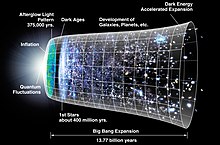


- We do have something of a story here, a true story, that we can work with religiously should we elect to do so. … There are clearly all sorts of flavors right now, just as there were when … Christianity was being put together, which took centuries to get the core in place and has been under revision ever since. Let's keep talking!
- It seems far simpler to go ahead and say that the epic is a fantastic myth, that happens to be true of the material Universe, that other myths are true in terms of their cultural meaning, and that there's absolutely no problem with holding more than one story, just as there's no problem with viewing the sunset in terms of planetary rotation and spectra and nuclear fusions one moment and as visual splendor the next.
- I profess my Faith. For me, the existence of all this complexity and awareness and intent and beauty, and my ability to apprehend it, serves as the ultimate meaning and the ultimate value. The continuation of life reaches around, grabs its own tail, and forms a sacred circle that requires no further justification, no Creator, no super-ordinate meaning of meaning, no purpose other than that the continuation continue until the sun collapses or the final meteor collides. I confess a credo of continuation. And in so doing, I confess as well a credo of human continuation.
- The concept of an independent "spiritual realm" does not augment, for me, the magic of the mystical dimension, whereas to think of this dimension as emergent from our minds makes it all the more wondrous to be a human.
- As quoted in The Faith of Scientists : In Their Own Words (2008) by Nancy K. Frankenberry, p. 491
- Human consensus does not generate reality. Were it able to do so, the Sun would have taken to orbiting the Earth some time ago.
- I think that with all the emphasis on achievement, careers and competitiveness, science education has become — with notable bright spots to be sure — a joyless, alienating and frustrating experience for millions and millions of kids.
There are those science-fair-winner types and then there's the rest of the class, not grooving on the material and hence, they find out, doomed to mediocre futures. Seems like ambivalence and hostility aren't such surprising responses to such a message. … I think things might go better if the narrative of our scientific understandings of nature — what some are calling "Big History" — were told early and often, capturing the interest and imagination of students from a young age. They might then be eager to learn the problem-solving, evidence-based process of scientific inquiry that has led to these understandings.
- While I agree… that indifference is indeed our most dangerous capacity, I actually do believe that it's on the wane.
When I scroll back to my 1950's Connecticut girlhood and recall how clueless everyone was about just about everything, how we mindlessly parroted concepts like "Better Dead Than Red" and the "Domino Theory," how my friends were all lily-white and Koreans were gooks and I would have had no idea where to find Nigeria on a map – when I go back there and then think about Adam's students and my students and my kids and what they've come to understand and care about, it gets a whole lot better.- "Indifference: Far And Away The Most Dangerous Human Capacity", 13.7: Cosmos & Culture (28 April 2011)
- Scientific inquiry has provisioned us with a mind-boggling new core narrative — the epic of evolution, the epic of creation, the universe story, big history, everybody's story — where humans and human cultures are understood to be emergent from and, hence, a part of nature.
Naturalists adopt this account as their core narrative, with full recognition that these understandings will certainly deepen and may shift with further scientific inquiry. They adopt the story currently on offer and do not simply select features of the story that support preferred theories of nature. … A religious naturalist is a naturalist who has adopted the epic as a core narrative and goes on to explore its religious potential, developing interpretive, spiritual and moral/ethical responses to the story.
Importantly, these responses are not front-loaded into the story as they are in the traditions. Therefore, the religious naturalist engages in a process, both individually and in the company of fellow explorers, to discover and experience them. These explorations are informed and guided by the mindful understandings inherent in our human traditions, including art, literature, philosophy and the religions of the world.
The Sacred Depths of Nature (1998)
[edit]
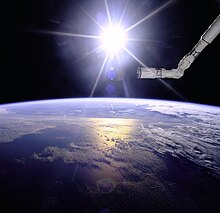



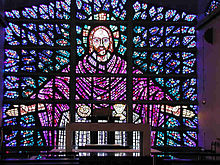





- The role of religion is to integrate the Cosmology and the Morality, to render the cosmological narrative so rich and compelling that it elicits our allegiance and our commitment to its emergent moral understandings. As each culture evolves, a unique Cosmos and Ethos appear in its co-evolving religion. For billions of us, back to the first humans, the stories, ceremonies, and art associated with our religions-of-origin are central to our matrix.
I stand in awe of these religions. I am deeply enmeshed in one of them myself. I have no need to take on the contradictions or immiscibilities between them, any more that I would quarrel with the fact that Scottish bagpipes coexist with Japanese tea ceremonies.- p. xiv
- The Big Bang, the formation of stars and planets, the origin and evolution of life on this planet, the advent of human consciousness and the resultant evolution of cultures — this is the story, the one story, that has the potential to unite us, because it happens to be true.
- p. xv
- Any global tradition needs to begin with a shared worldview — a culture-independent, globally accepted consensus as to how things are. From my perspective, this part is easy. How things are is, well, how things are; our scientific account of Nature, an account that can be called the Epic of Evolution… This is the story, the one story, that has the potential to unite us, because it happens to be true.
If religious emotions can be elicited by natural reality — and I believe that they can — then the story of Nature has the potential to serve as the cosmos for the global ethos that we need to articulate. I will not presume to suggest what this ethos might look like. Its articulation must be a global project. But I am convinced that the project can be undertaken only if we all experience a solemn gratitude that we exist at all, share a reverence for how life works, and acknowledge a deep and complex imperative that life continue.- p. xvi
- The evolution of the cosmos invokes in me a sense of mystery; the increase in biodiversity invokes the response of humility; and an understanding of the evolution of death offers me helpful ways to think about my own death.
- p. xx
- Human memory, they say, is like a coat closet: The most enduring outcome of a formal education is that it creates rows of coat hooks so that later on, when you come upon a new piece of information, you have a hook to hang it on. Without a hook, the new information falls on the floor.
- p xxi
- For me, Deism doesn't work because I find I can only think of a creator in human terms, and the concept of a human-like creator of muons and neutrinos has no meaning for me. But more profoundly, Deism spoils my covenant with Mystery. To assign attributes to Mystery is to disenchant it, to take away its luminance. I think of the ancients ascribing thunder and lightning to godly feuds, and I smile. The need for explanation pulsates in us all.
- p. 11
- Life from nonlife, like wine from water, has long been considered a miracle wrought by gods or God. Now it is seen to be the near-inevitable consequence of our thermal and chemical circumstances.
- p. 28
- The religious naturalist is provisioned with tales of natural emergence that are, to my mind, far more magical than traditional miracles. Emergence is inherent in everything that is alive, allowing our yearning for supernatural miracles to be subsumed by our joy in the countless miracles that surround us.
- p. 30
- The biochemistry and biophysics are the notes required for life; they conspire, collectively, to generate the real unit of life, the organism. The intermediate level, the chords and tempos, has to do with how the biochemistry and biophysics are organized, arranged, played out in space and time to produce a creature who grows and divides and is.
- p. 49
- Patterns of gene expression are to organisms as melodies and harmonies are to sonatas. It's all about which sets of proteins appear in a cell at the same time (the chords) and which sets come before or after other sets (the themes) and at what rate they appear (the tempos) and how they modulate one another (the developments and transitions). When these patterns go awry we may see malignancy. When they change by mutation we can get new kinds of organisms. When they work, we get a creature.
- p. 59
- I have come to understand that the self, my self, is inherently sacred. By virtue of its own improbability, its own miracle, its own emergence … And so I lift up my head, and I bear my own witness, with affection and tenderness and respect. And in so doing, I sanctify myself with my own grace.
- p. 60
- We are embedded in the great evolutionary story of planet Earth, the spare, elegant process of mutation and selection and bricolage. And this means that we are anything but alone.
- p. 75
- Once there is empathy, then there can be the feeling we call compassion. A version of the Golden Rule — Do unto others as you would have them do unto you — is found in most religious traditions. … and emergent from our sense of compassion, in mortal conflict with our insistent sense that we should win, is our haunting sense that things should be fair.
- p. 114
- We nurture our children selflessly. But we also recognize them as our most tangible sources of renewal — for a child, the world is always new. Renewal has been a religious theme throughout the ages … All of us see in children — our own and all children — the hope and promise of what we humans can become. As the forbears of our children we are called to transmit to them a joyous and sustainable vision of their future — meaning that we are each called to develop such a vision.
- p. 129
- For me, and probably for all of us, the concept of a personal, interested god can be appealing, often deeply so. In times of sorrow or despair, I often wonder what it would be like to be able to pray to God or Allah or Jehovah or Mary and believe that I was heard, believe that my petition might be answered. When I sing the hymns of faith in Jesus' love, I am drawn to their intimacy, their allure, their poetry. But in the end, such faith is simply not available to me. I can’t do it. I lack the resources to render my capacity for love and my need to be loved to supernatural Beings. And so I have no choice but to pour these capacities and needs into earthly relationships, fragile and mortal and difficult as they often are.
- p. 139
- Sex without death gets you single-celled algae and fungi; sex with a mortal soma gets you the rest of the eukaryotic creatures. Death is the price paid to have trees, and clams and birds and grasshoppers, and death is the price paid to have human consciousness, to be aware of all that shimmering awareness and all that love.
- p. 151
- We are, each one of us, ordained to live out our lives in the context of ultimate questions, such as:
Why is there anything at all, rather than nothing?
Where did the laws of physics come from?
Why does the universe seem so strange?
My response to such questions has been to articulate a covenant with Mystery. Others, of course, prefer to respond with answers, answers that often include a concept of god. These answers are by definition beliefs since they can neither be proven nor refuted. They may be gleaned from existing faith traditions or from personal search. God may be apprehended as a remote Author without present-day agency, or as an interested Presence with whom one can form a relationship, or as pantheistic — Inherent in All Things.
The opportunity to develop personal beliefs in response to questions of ultimacy, including the active decision to hold no Beliefs at all, is central to the human experience. The important part, I believe, is that the questions be openly encountered. To take the universe on — to ask Why Are Things As They Are? — is to generate the foundation for everything else.- p. 167
- When the responses elicited by the Epic of Evolution are gathered together several religious principles emerge that I can believe, serve as a framework for a global Ethos.
- p. 167
- We arrived but a moment ago, and found [Earth] to be perfect for us in every way. And then we came to understand that it is perfect because we arose from it and are a part of it. Hosannah! Not in the highest, but right here, right now, this. When such gratitude flows from our beings, it matters little whether we
- p. 169
- The tapestry maker first strings the warp, long strong fibers anchored firmly to the loom, and then interweaves the weft, the patterns, the color, the art. The epic of evolution is our warp, destined to endure, commanding our universal gratitude and reverence and commitment. And then, after that, we are all free to be artists, to render in language and painting and song and dance our ultimate hopes and concerns and understandings of human nature. Throughout the ages, the weaving of our religious weft has been the province of our prophets and gurus and liturgists and poets. The texts and art and ritual that come to us from these revered ancestors include claims about Nature and Agency that are no longer plausible. They use a different warp. But for me at least, this is just one of those historical facts, something that can be absorbed, appreciated, and then put aside as I encounter the deep wisdom embedded in these traditions and the abundant opportunities that they offer to experience transcendence and clarity.
- p. 173
- I love traditional religions. Whenever I wander into distinctive churches or mosques or temples, or visit museums of religious art, or hear performances of sacred music, I am enthralled by the beauty and solemnity and power they offer. Once we have our feelings about Nature in place, then I believe that we can also find important ways to call ourselves Jews, or Muslims, or Taoists, or Hopi, or Hindus, or Christians, or Buddhists. Or some of each. The words in the traditional texts may sound different to us than they did to their authors, but they continue to resonate with our religious selves. We know what they are intended to mean.
- p. 173
- Humans need stories — grand compelling stories — that help to orient us in our lives in the cosmos. The Epic of Evolution is such a story, beautifully suited to anchor our search for planetary consensus, telling us of our nature, our place, our context. Moreover, responses to this story — what we are calling religious naturalism — can yield deep and abiding spiritual experiences. And then, after that, we need other stories as well, human-centered stories, a mythos that embodies our ideals and our passions. This mythos comes to us, often in experiences called revelation, from the sages and the artists of past and present times.
- p. 174
Science and Spirit interview (2004)
[edit]
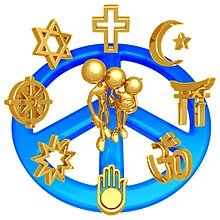
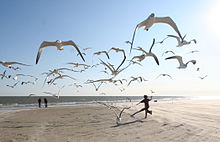
- All life has a kind of seamlessness. All creatures have to be aware of their environment, and there has been an evolution of the capacities needed for detecting increasingly complex stimuli. I have no problem calling this "meaning," since all creatures pick out meaningful facets of their environment. For the first creatures, these facets were physical and mediated by receptor proteins. Sperm and eggs find each other by protein shapes; photosynthetic bacteria find light by protein shapes. The impetus to figure out what's going on is still very much programmed into our highly complex brains.
- A great many people say we have language and imagination to posit creators, interveners, and agencies that we can't actually prove. And yet some people experience God within them--these experiences are not drawn-up hypotheses. It's possible those of us who don't feel God within them have deficient brains that aren't capable of such experiences; or alternatively, the people who experience these things have brains that somehow create them. As near as I can tell, the jury is out on that. I may be a non-theist who doesn't include a god concept in my religious orientation because I have an incompetent brain, or perhaps theists have brains giving them inaccurate information.
- I don't have any problem accessing experiences of unity. I feel completely part of the universe and all that's going on. When I try to describe it, people say I'm obviously a mystic. It doesn't seem mystical to me in a theistic sense. It's not a state that engenders in me any sense that God is watching over me and paying attention to what I'm doing. It's much more what I understand the Eastern traditions to be talking about — a belonging to the universe, an overflow of astonishment and wonder and peace and tranquility.
- The big bang is obviously one form of beginning, but the big bang in itself is unimaginable. It's one thing to think about God making a flower or infusing the planet with love, but to imagine what might be behind the big bang is so removed from real life that it actually loses importance for me. There's so much else to think about that's here and now. I like the Buddhist concept of beginning-less-ness, that the universe has always been going on.
- The Buddhist view is more congruent with evolution than are other views. You can actually have beginning-less-ness and still have creation of a particular universe … The part that doesn't jibe for me is the whole notion that consciousness is this separate thing that goes in and out of sentient beings.
- The good stuff of most religions turns out to be a golden rule that defines a morality which allows humans to flourish in community. We come from a whole lineage of creatures who are robustly social and have communities that work, so you look at how their flourishing communities are set up. Are there parallels between how life works in a structured, non-human primate group, in a human community, and in the moral guidelines religion offers? It's not all that different as far as I can tell-there is hierarchy, strategic reciprocity, nurture and empathy.
- Perhaps we should all settle down and think about what's good in the world and what we want to do here. If we find this planet and its history and its story to be sacred, let's preserve and nourish it, and then we can go home at night and say whatever prayers we choose.
- There are two flavors of God people: those whose God is natural and those whose God is supernatural. Certainly there are a lot of people within religious naturalism who have no problem with God language — God as love, God as evolution, God as process. People see God as part of nature and give God-attributes to the part of nature that they find most sacred. I encounter people like that all the time.
- The people who are truly bothered by God-concepts and find them stupid or ignorant or pathological are those like Richard Dawkins who just can't even imagine anybody having such concepts. That view is almost like homophobia — it's not open and pluralistic. I'm much more interested in helping people engage in this story of evolution. If they do that with theistic language, that's great.
- We all eat or are eaten. That's the way life works, it's a greater rhythm. And that's why science and the understandings it has uncovered can be a source of joy.
This all relates to assent, a very important Judeo-Christian concept. "Thy will be done" is a God-kind of assent. "God works in mysterious ways," and you're supposed to give assent even if you don't like it. As a religious naturalist, I think of assent differently. Assent is saying, "Okay, for whatever reason, this is the way life works. It's an acceptance of what is. After that fundamental acceptance, I can live my life to minimize suffering and promote as much as good as I can, and try through whatever work I do to help others." We can't get around death, but we can get around poverty. We can try to avoid women being brutalized. We can curb environmental degradation.
One can start from the perspective of a religious naturalist or from the perspective of the world religions and arrive at the same place: a moral imperative that this Earth and its creatures be respected and cherished.
Uncommon Knowledge (2005)
[edit]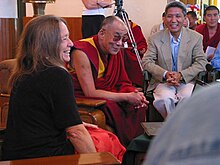
- The most reliable joy is to be out of doors, to be a creature among other creatures. I find it very restful.
- Reverence is the sense that there is something larger than the self, larger even than the human, to which one accords respect and awe and assent.
- The word "religion" goes back to the Latin ligere, "to bind." So religion means "to bind together again." I think we should develop religions that allow us to do that.
- Law is necessary, but in a more functional culture, it would presumably be less necessary than it is now, because people would know what to do.
- There are two kinds of power. "Power over" is very problematical. "Power within" is very exciting. You can tell the difference by whether you are messing with other people or not.
- What scares me? The way the world is going. People seem to think that development is more important than sustainability. That fundamentalism is more important than openness. That racial differences should dictate political decisions. That a person's sexuality is somebody else's business.
- I like mindful people. Fear prevents mindfulness, and then greed marches in because you are fearful, so you feel like you have to shore everything up.
- You can't have thought without emotion, and one emotion is fear, and making an important decision on the basis of fear is not a good idea. So develop your courage.
Meaning of Life interview (2008)
[edit]
- Interview with Robert Wright at Slate (2008)
- Naturalism has been defined by many people. It's just a world view that does not include the supernatural so it's everything else.
- Well, God answers of course come in every flavor imaginable these days so God can be process-God can be mind-God … so there are all of these ways that God is now configured as well as the ones that come to us from traditional religions where God has much more power — then there's the whole personal God part which I do talk about in there at some point. So I don't think that even that there is a God framework out there at this point that I am either accepting or rejecting. My response is that I call myself a non-theist as opposed to an atheist because as I see an atheist as having a belief about God, i.e. that there isn't one. And my I've never been actually very interested in the question I guess is one way to put it. I see it as a question That can be summarized in the aphorism "Why is there anything at all rather than nothing." And science doesn't have any answer to That so what I articulated in the book and continued to do is what I call a covenant with mystery where mystery is itself a … noun but I am using it as literally in absence of category. It's not like I have a mystery then I put attributions onto it it just … I don't know the answers.
- There are all sorts of transcendent response on offer but they to my mind are not necessary to call oneself religious. And obviously this is … semantics as much as anything else. But I do go ahead and consider myself a religious person.

